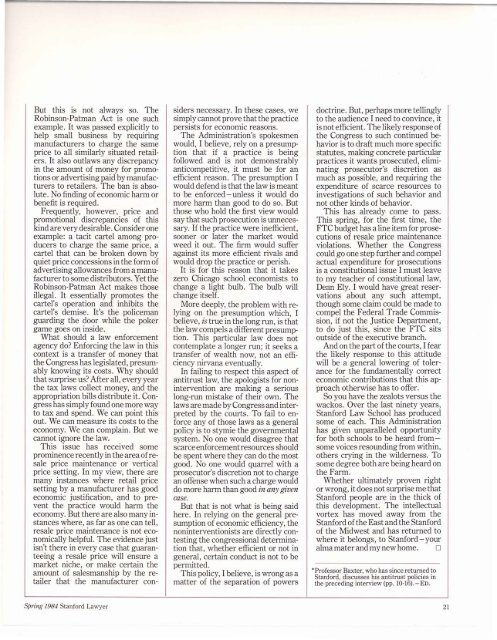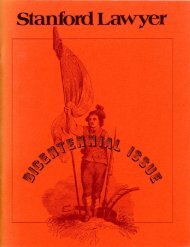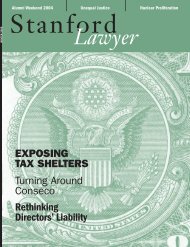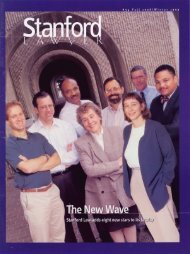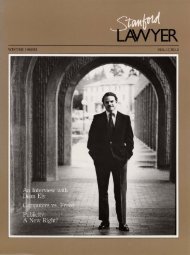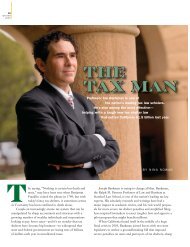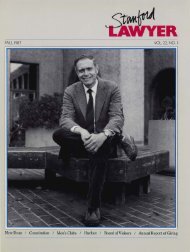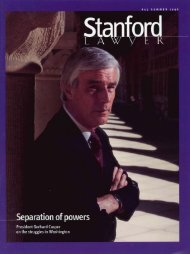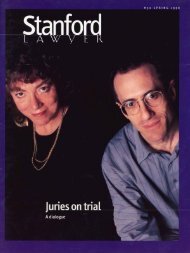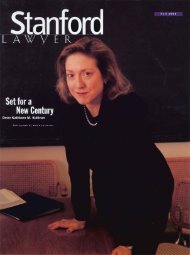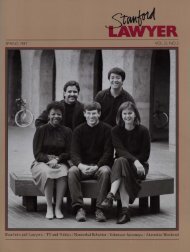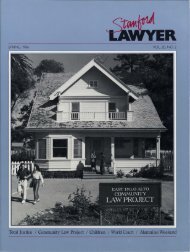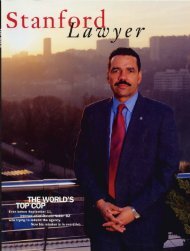Spring 1984 – Issue 31 - Stanford Lawyer - Stanford University
Spring 1984 – Issue 31 - Stanford Lawyer - Stanford University
Spring 1984 – Issue 31 - Stanford Lawyer - Stanford University
- No tags were found...
Create successful ePaper yourself
Turn your PDF publications into a flip-book with our unique Google optimized e-Paper software.
But this is not always so. TheRobinson-Patman Act is one suchexample. It was passed explicitly tohelp small business by requiringmanufacturers to charge the sameprice to all similarly situated retailers.It also outlaws any discrepancyin the amount of money for promotionsor advertising paid by manufacturersto retailers. The ban is absolute.No finding of economic harm orbenefit is required.Frequently, however, price andpromotional discrepancies of thiskind are verydesirable. Consider oneexample: a tacit cartel among producersto charge the same price, acartel that can be broken down byquiet price concessions in the form ofadvertising allowances from a manufacturerto some distributors. Yet theRobinson-Patman Act makes thoseillegal. It essentially promotes thecartel's operation and inhibits thecartel's demise. It's the policemanguarding the door while the pokergame goes on inside.What should a law enforcementagency do? Enforcing the law in thiscontext is a transfer of money thatthe Congress has legislated, presumablyknowing its costs. Why shouldthat surprise us? After all, every yearthe tax laws collect money, and theappropriation bills distribute it. Congresshas simply found one more wayto tax and spend. We can point thisout. We can measure its costs to theeconomy. We can complain. But wecannot ignore the law.This issue has received someprominence recently in the areaofresaleprice maintenance or verticalprice setting. In my view, there aremany instances where retail pricesetting by a manufacturer has goodeconomic justification, and to preventthe practice would harm theeconomy. But there are also many instanceswhere, as far as one can tell,resale price maintenance is not economicallyhelpful. The evidence justisn't there in every case that guaranteeinga resale price will ensure amarket niche, or make certain theamount of salesmanship by the retailerthat the manufacturer con-siders necessary. In these cases, wesimply cannot prove that the practicepersists for economic reasons.The Administration's spokesmenwould, I believe, rely on a presumptionthat if a practice is beingfollowed and is not demonstrablyanticompetitive, it must be for anefficient reason. The presumption Iwould defend is that the law is meantto be enforced - unless it would domore harm than good to do so. Butthose who hold the first view wouldsay that such prosecution is unnecessary.If the practice were inefficient,sooner or later the market wouldweed it out. The firm would sufferagainst its more efficient rivals andwould drop the practice or perish.It is for this reason that it takeszero Chicago school economists tochange a light bulb. The bulb willchange itself.More deeply, the problem with relyingon the presumption which, Ibelieve, is true in the long run, is thatthe law compels a different presumption.This particular law does notcontemplate a longer run; it seeks atransfer of wealth now, not an efficiencynirvana eventually.In failing to respect this aspect ofantitrust law, the apologists for noninterventionare making a seriouslong-run mistake of their own. Thelaws are made by Congress and interpretedby the courts. To fail to enforceany of those laws as a generalpolicy is to stymie the governmentalsystem. No one would disagree thatscarceenforcementresources shouldbe spent where they can do the mostgood. No one would quarrel with aprosecutor's discretion not to chargean offense when such a charge woulddo more harm than good in any givencase.But that is not what is being saidhere. In relying on the general presumptionof economic efficiency, thenoninterventionists are directly contestingthe congressional determinationthat, whether efficient or not ingeneral, certain conduct is not to bepermitted.This policy, I believe, is wrong as amatter of the separation of powersdoctrine. But, perhaps more tellinglyto the audience I need to convince, itis not efficient. Thelikely response ofthe Congress to such continued behavioris to draft much more specificstatutes, making concrete particularpractices it wants prosecuted, eliminatingprosecutor's discretion asmuch as possible, and requiring theexpenditure of scarce resources toinvestigations of such behavior andnot other kinds of behavior.This has already come to pass.This spring, for the first time, theFTCbudget has a line item for prosecutionsof resale price maintenanceviolations. Whether the Congresscould go one step further and compelactual expenditure for prosecutionsis a constitutional issue I must leaveto my teacher of constitutional law,Dean Ely. I would have great reservationsabout any such attempt,though some claim could be made tocompel the Federal Trade Commission,if not the Justice Department,to do just this, since the FTC sitsoutside of the executive branch.And on the part of the courts, I fearthe likely response to this attitudewill be a general lowering of tolerancefor the fundamentally correcteconomic contributions that this approachotherwise has to offer.So you have the zealots versus thewackos. Over the last ninety years,<strong>Stanford</strong> Law School has producedsome of each. This Administrationhas given unparalleled opportunityfor both schools to be heard fromsomevoices resounding from within,others crying in the wilderness. Tosome degree both are being heard onthe Farm.Whether ultimately proven rightor wrong, it does not surprise me that<strong>Stanford</strong> people are in the thick ofthis development. The intellectualvortex has moved away from the<strong>Stanford</strong> of the East and the <strong>Stanford</strong>of the Midwest and has returned towhere it belongs, to <strong>Stanford</strong>-youralma mater and my new home. D*Professor Baxter, who has since returned to<strong>Stanford</strong>, discusses his antitrust policies inthe preceding interview (pp. 10-16). - En.<strong>Spring</strong> <strong>1984</strong> <strong>Stanford</strong> <strong>Lawyer</strong>21


